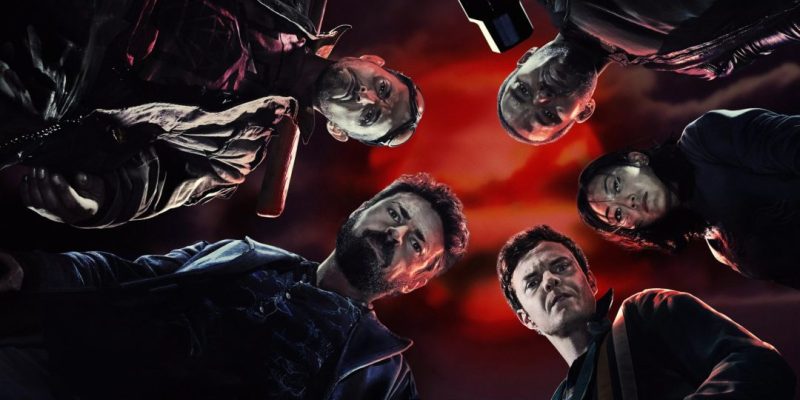Amazon Prime’s new television series The Boys is an absolute romp. The show imagines what the world would look like if the modern superhero were combined with big box industry and toxic capitalism. The result is a veritable legal playground. This week, I’ll consider some of the issues raised in the show’s pilot.
Superhero Accidents
Towards the beginning of the pilot, we see protagonist Hughie Campbell talking with his girlfriend, Robin. In the middle of their conversation, out of nowhere, superhero speedster A-Train runs into Robin at full speed, leaving behind nothing but a pair of hands (held by a traumatized Hughie) and a puddle of blood. Hughie later tells us that he can’t file a wrongful death suit against A-Train since he and his girlfriend weren’t married, and that he can’t file a criminal case, since “supes are like cops and can’t be charged for damages while they’re on the job.”
Hughie isn’t entirely correct. We can start with his claim about superhero immunity. It’s pretty easy to imagine a law that would treat career superheroes like cops. But police protections are not absolute. In fact, there is no immunity in criminal cases, and police officers can be charged and convicted for deaths caused on the job.
When it comes to civil cases, police officers and superheroes for the show’s purposes benefit from qualified immunity. This means that they can only be held liable for wrongdoing if they violate a “clearly established” right. In practice, this means that officers can only be held liable if they knew or should have known that their actions were unlawful.

With that in mind, what kind of suit would Hughie have been able to bring in The Boys? He’s right that he would not have been able to bring a wrongful death suit — those can only be brought by family members or domestic partners. But Hughie is not out of luck. He can still file a claim for negligent infliction of emotional distress or for intentional infliction of emotional distress. I’ve considered those claims before when evaluating whether there could be a legal remedy for spoilers, but they take on more weight here.
To succeed on a claim for negligent infliction of emotional distress, Hughie would have to show that A-Train was negligent, that the negligence caused mental or emotional harm, that there was some physical contact or impact (blood spattering would count), and that his emotional suffering was foreseeable. In some states, he would also have to show that he was in immediate risk of physical harm.
The elements for intentional infliction of emotional distress are similar, but they would require Hughie to show that A-Train’s conduct was extreme and outrageous, and that he intended to cause severe emotional distress. Based on the facts, Hughie would be able to sue A-Train for both negligent and intentional infliction of emotional distress, and he would have a high chance of success, even in the face of A-Train’s qualified immunity.
The Apology That Wasn’t
Perhaps recognizing that Hughie would have a claim, A-Train — through his attorney — offered Hughie a settlement. Under the settlement, Hughie would receive $45,000. In exchange, he would agree to release all of his claims against A-Train and to not disclose any details of the accident to anyone. In presenting the agreement, the lawyer explicitly stated that any apology A-Train made was not an admission of guilt. What gives?
Apologies can be used as evidence of guilt or liability. This makes sense, as one of the primary purposes of an apology is to express remorse for wrongdoing. But the issue isn’t as clear-cut as A-Train’s attorney might think. For one thing, an attorney can’t change the meaning of a statement simply by issuing a disclaimer. The apology would speak for itself.
But the bigger issue is that genuine apologies often preclude the need for litigation in the first place. Hughie’s experience is a good example — if A-Train had personally reached out, apologized, and expressed genuine remorse for his mistake, Hughie likely would have understood and would not have even wanted to pursue legal action. That’s especially true if the apology were accompanied by a settlement agreement.
For what it’s worth, some states have recognized that people should not be punished for apologizing or expressing remorse, and they have passed laws that make apologies inadmissible as evidence of guilt or liability. It looks like the events of The Boys did not take place in one of those states.

Indecent Exposure
One of the superheroes in The Boys is Translucent, who has the power of invisibility. But since his power only applies to his body, it only works if he is naked. If he walks around the city in the nude, but invisible, can he be charged with indecent exposure? It depends on the state.
In New York, a person is guilty of indecent exposure “if he appears in a public place” such that the private parts of his body “are unclothed or exposed.” That would seem to cover Translucent in the event that he makes any appearance (even just showing his face), since he would have appeared, and his private parts would be unclothed.
Most states, however, only outlaw “lewd” exposures or those with an element of sexual gratification, which likely would not apply to Translucent in his invisible form. Regardless of what the law says, no reasonable prosecutor would consider charging an invisible person with indecent exposure, since there would be no harm.
When people think of dystopian superhero futures, they typically think of stories involving some kind of evil Superman or warped Injustice League. The Boys presents a different vision, where the problem is not superheroes themselves but the capitalist system in which they live. The thing about A-Train is not that he could obliterate a person in broad daylight — it’s that he can get away with it because he has a mega-corporation behind him, with an army of expensive attorneys as his foot soldiers.
While you pretty much have to suspend your disbelief in order to watch any superhero show, as an attorney, I take solace in the fact that the suspension of disbelief in The Boys relates not just to superhero antics, but also to real-world legal remedies and protections. Since I’m not a biologist or physicist, I can’t say whether someone like A-Train could ever exist in the real world. But I can say that if someone like A-Train did exist, Hughie would have his remedy and A-Train’s superpowers would not be able to save him from the law.
